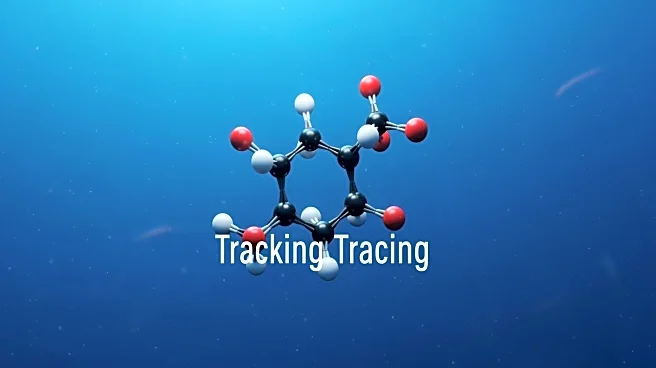What's Happening?
A team of chemists, microbiologists, and ecologists has created a molecular probe that glows when sugars are broken down, allowing scientists to observe the competition between algae and microbes in marine
ecosystems. This innovation, detailed in the journal JACS, enables real-time tracking of sugar degradation, a process central to the ocean's carbon cycle. Algae convert carbon dioxide into oxygen and organic matter, with sugars playing a key role. However, complex sugars often resist microbial digestion, trapping carbon on the seafloor for centuries. The new probe uses automated glycan assembly to tag sugars with fluorescent dyes, which emit light when enzymes break the sugar's backbone. This allows researchers to pinpoint where and when sugar degradation occurs, providing insights into microbial metabolism and carbon flux in the ocean.
Why It's Important?
Understanding how sugars are degraded in marine ecosystems is crucial for comprehending the ocean's carbon cycle. The ability to track sugar breakdown in real-time offers significant advancements in studying microbial interactions and carbon flux. This research could lead to better predictions of carbon sequestration and release in marine environments, impacting climate models and environmental policies. By identifying active microbial degraders and their enzymatic activities, scientists can gain insights into the ecological roles of different microorganisms, potentially influencing conservation strategies and resource management in oceanic ecosystems.
What's Next?
The development of this molecular probe opens new avenues for research into microbial metabolism and carbon cycling. Scientists can now study phytoplankton-bacterioplankton interactions more effectively, mapping glycan breakdown across various ecosystems. This tool may lead to discoveries about microbial roles in carbon sequestration and release, influencing climate change models and environmental policies. Future research could focus on applying this technology to other complex ecosystems, such as the human gut, to explore microbial interactions and their impact on health and disease.
Beyond the Headlines
The interdisciplinary collaboration between Max Planck Institutes highlights the importance of combining expertise from different scientific fields to tackle complex environmental issues. This research not only advances our understanding of marine ecosystems but also demonstrates the potential for similar approaches in other areas, such as human health and agriculture. The ability to track microbial activity without prior genomic knowledge could revolutionize studies of microbial communities, offering new insights into their roles in various ecological processes.









